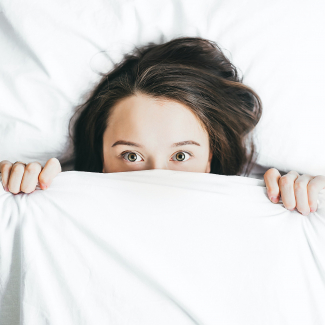The science behind sleep
Photo by Alexandra Gorn on Unsplash
Sleep is precious. It can fill our day with positivity and give us the focus and energy to be at our very best. It restores our mind and gives our whole body – including our eyes – a chance to rest and re-energise.
We’re tapping into the science behind sleep and sharing our top tips for a peaceful slumber, night after night.
The stages of sleep: what happens in each

Sleep might seem like a peaceful state, but under that calm exterior, the brain and body are hard at work. Our body passes through five different stages of sleep each night: four stages of ‘non-REM sleep’ (non-rapid eye movement) and one stage of ‘REM sleep’ (rapid eye movement). Each phase plays a distinct role in restoring our body and brain.
The first four phases involve a transition from light sleep, during which the muscles start to relax and the heart slows, to deep sleep whereby muscles are restored and replenished.
The final stage — REM sleep — usually happens 90 minutes after you fall asleep and involves heightened brain activity and vivid dreams. During this phase, your eyes move back and forth rapidly as your brain processes, organises and stores information from your day. Studies have also shown that REM sleep resets stress levels, enabling us to think clearly the next day. Researchers don’t know exactly why our eyes move during REM sleep, but it’s believed to be associated with a ‘change of scene’ in our dreams.
Why is it important to get enough sleep?

We’ve all experienced the fatigue, crankiness and lack of focus that follow a poor night’s sleep. But getting the recommended seven to nine hours sleep can affect more than just our mood and motivation. It also plays an important part in preventing health issues, including obesity, heart disease and diabetes.
Just like our body, our eyes need sleep to rest and replenish. Without enough sleep, the eyes can become dry and gritty, and you may even experience blurry vision or sensitivity to light.
One common effect of sleep deprivation and fatigue is eye spasms, also known as myokymia. While eye spasms can be uncomfortable, they’re usually temporary and tend to disappear after you’ve caught up on sleep.
Tips to get a good night’s sleep:

Build healthy habits into your day
Practising healthy habits during the day can contribute towards a good night’s sleep. Light is a powerful guide for our body. Exposing yourself to sunlight in the morning not only alerts your brain to wake up but it also helps regulate our sleep patterns.
Regular physical activity has also been shown to have powerful sleep benefits. But it’s important to time your exercise right — try to finish workouts at least three hours before bedtime.
Other daytime habits that promote a good night’s slumber include eating a healthy diet, limiting naps, and avoiding stimulants like alcohol, caffeine and nicotine.
Wind down before bed
Winding down before bed can reduce mental and physical stimulation and help you sleep better. The blue light from digital devices, like phones, laptops and TVs, can mess with the quality of our sleep. Try limiting screen time within an hour or so of bedtime. Instead, take a warm bath, read a book or try 15 minutes of meditation. Gentle yoga stretches can also help the body relax. This one is obvious but try to swap alcohol and caffeine for a warm malty drink.
Establish a regular sleep routine
Sticking to a regular sleep schedule lets your body settle into its natural rhythm, and helps you doze off and wake up more easily. What’s more, following a consistent bedtime routine, such as putting on your PJs, removing your contact lenses and brushing your teeth, can signal to your brain that it’s time to rest.
Create a sleep sanctuary
With the pressures of modern life, it’s not always easy to make your bedroom an oasis of calm and serenity. But if possible, try to keep it comfy, uncluttered and free of digital distractions. Since we spend a third of our life in bed, it’s worth investing in a comfy mattress, duvet and pillows. If you’re sensitive to light or noise, try an eye mask or foam earplugs. While the room should be cosy, experts suggest that 16-18°C is the ideal temperature for sleep.
Before you slip into a deep slumber, remember to remove your contact lenses. That way, you’ll give your eyes a chance to breathe and keep your eyes healthy and infection-free. You'll find expert (and easy) tips on how to clean and store your contact lenses here.
Happy dreaming!


